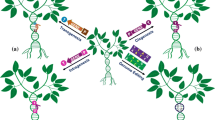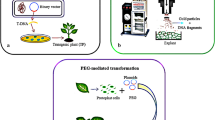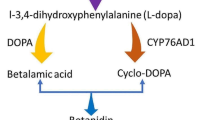Abstract
A new selectable marker system has been adapted for use in Agrobacterium-mediated transformation of maize. This selection system utilizes the pmi gene encoding for phosphomannose-isomerase that converts mannose-6-phosphate to fructose-6-phosphate. Only transformed cells are capable of utilizing mannose as a carbon source. Agrobacterium-mediated transformation of immature embryos followed by a pre-selection of 10–14 days prior to selection at a level of 1% mannose and 0.5% sucrose led to the recovery of trangenic lines of a frequency of as high as 30% in about 12 weeks. Molecular and genetic analysis showed that selected plants contained the pmi gene and that the gene was transmitted to the progeny in a Mendelian fashion.
Similar content being viewed by others
Author information
Authors and Affiliations
Additional information
Received: 24 August 1999 / Revision received: 27 September 1999 / Accepted: 9 November 1999
Rights and permissions
About this article
Cite this article
Negrotto, D., Jolley, M., Beer, S. et al. The use of phosphomannose-isomerase as a selectable marker to recover transgenic maize plants (Zea mays L.) via Agrobacterium transformation. Plant Cell Reports 19, 798–803 (2000). https://doi.org/10.1007/s002999900187
Issue Date:
DOI: https://doi.org/10.1007/s002999900187




